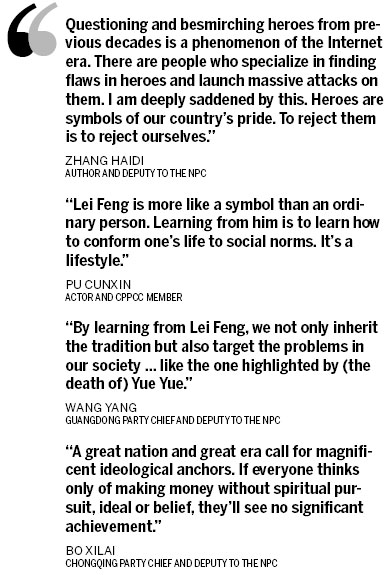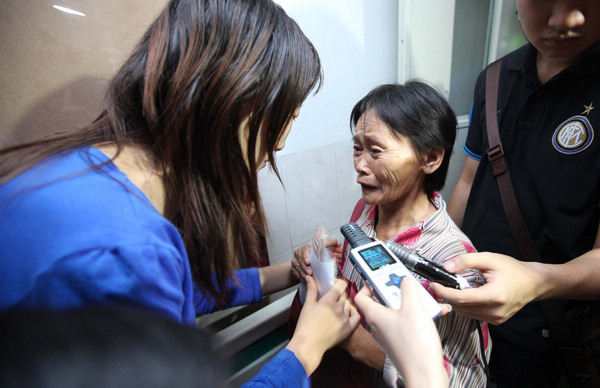Lei Feng continues to lead by heroic example
Updated: 2012-03-05 08:17
By Wu Wencong and Feng Zhiwei (China Daily)
|
||||||||
Great loss
Social morality has been a hot topic since early last year, when a series of news stories appeared to highlight the unwillingness among bystanders to help people in need.
Many incidents involved elderly people falling to the ground, including an 88-year-old man who choked to death as people looked on.
Arguably the most shocking was the case of Wang Yue, the toddler who was ignored by 18 passers-by after being run over by two vehicles in Shenzhen, Guangdong province. Video footage taken by surveillance cameras was posted online in mid-October and caused outrage. The 2-year-old girl, known more commonly by her nickname Yue Yue, died in hospital several days later.
The news resulted in media commentators, Web users and sociologists joining to lament the loss of social values in China.
Ever since, the government has been pushing the message of altruism, with several regional authorities even introducing policies to promote the need for role models.
Last month, officials in Changsha, Lei Feng's home city, announced that decisions about recruitment as well as employee medical benefits and housing will now favor candidates with strong charitable backgrounds.
Days earlier, Guangzhou also released a draft regulation for public consultation that said people who return lost money will get 10 percent as a reward.
Opinion has so far been divided on the policies.
|
 |
A commentary piece published by Weifang Evening News in East China's Shandong province on Feb 20 read: "Morality has nothing to do with material interests. Chen Xianmei, the trash collector who was the only person to try and help Yue Yue didn't lend a hand for the sake of a reward.
"If someone does good deeds just for the reward, it has nothing to do with morality. It's simply a business deal," it read.
Liu at the Lei Feng Memorial Hall disagreed, however, and argued that people need to have "the ability to help others" before they can lend a hand.
Tan Huangfang, his 52-year-old former colleague, added: "If all people get for helping is a certificate that says what a good person they are, others are not going to want to follow in their footsteps. That goes especially for those who are injured in the act of doing good deeds.
"What we need to publicize is not only to do good deeds and be a nice person, but also the notion that good people always get rewards," said the retired tour guide, who worked at the memorial hall from 1986 until 2009.

 Relief reaches isolated village
Relief reaches isolated village
 Rainfall poses new threats to quake-hit region
Rainfall poses new threats to quake-hit region
 Funerals begin for Boston bombing victims
Funerals begin for Boston bombing victims
 Quake takeaway from China's Air Force
Quake takeaway from China's Air Force
 Obama celebrates young inventors at science fair
Obama celebrates young inventors at science fair
 Earth Day marked around the world
Earth Day marked around the world
 Volunteer team helping students find sense of normalcy
Volunteer team helping students find sense of normalcy
 Ethnic groups quick to join rescue efforts
Ethnic groups quick to join rescue efforts
Most Viewed
Editor's Picks

|

|

|

|

|

|
Today's Top News
Health new priority for quake zone
Xi meets US top military officer
Japan's boats driven out of Diaoyu
China mulls online shopping legislation
Bird flu death toll rises to 22
Putin appoints new ambassador to China
Japanese ships blocked from Diaoyu Islands
Inspired by Guan, more Chinese pick up golf
US Weekly

|

|







